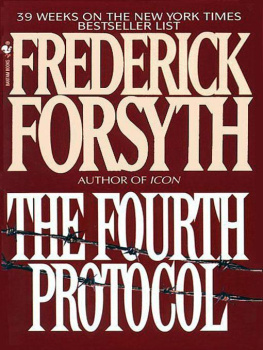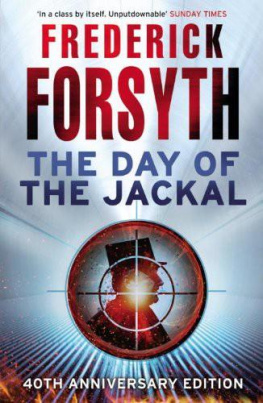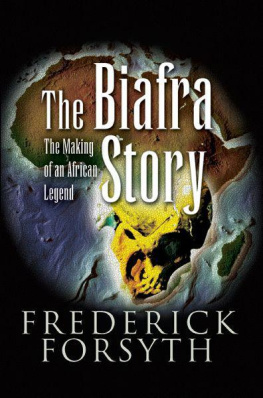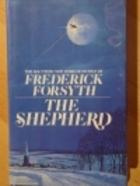Frederick Forsyth - The Deceiver
Here you can read online Frederick Forsyth - The Deceiver full text of the book (entire story) in english for free. Download pdf and epub, get meaning, cover and reviews about this ebook. genre: Detective and thriller. Description of the work, (preface) as well as reviews are available. Best literature library LitArk.com created for fans of good reading and offers a wide selection of genres:
Romance novel
Science fiction
Adventure
Detective
Science
History
Home and family
Prose
Art
Politics
Computer
Non-fiction
Religion
Business
Children
Humor
Choose a favorite category and find really read worthwhile books. Enjoy immersion in the world of imagination, feel the emotions of the characters or learn something new for yourself, make an fascinating discovery.

- Book:The Deceiver
- Author:
- Genre:
- Rating:3 / 5
- Favourites:Add to favourites
- Your mark:
- 60
- 1
- 2
- 3
- 4
- 5
The Deceiver: summary, description and annotation
We offer to read an annotation, description, summary or preface (depends on what the author of the book "The Deceiver" wrote himself). If you haven't found the necessary information about the book — write in the comments, we will try to find it.
The Deceiver — read online for free the complete book (whole text) full work
Below is the text of the book, divided by pages. System saving the place of the last page read, allows you to conveniently read the book "The Deceiver" online for free, without having to search again every time where you left off. Put a bookmark, and you can go to the page where you finished reading at any time.
Font size:
Interval:
Bookmark:
PRAISE FOR
THE DECEIVER
Nothing that Frederick Forsyth has written in the 20 years since his debut, The Day of the Jackal, is as solidly entertaining as The Deceiver. Thats how good it is.
Daily News, New York
Forsyths stalwart tribute to the spies who came in from the cold: four ingenious thriller-novellas featuring the intrigues of British superagent Sam McCready ... sophisticated, shrewd, roundly satisfying spy-stuff.
Kirkus Reviews
A master of Cold War suspense, Forsyth here points out a few directions toward which glasnost and the fall of the Berlin Wall might deflect the genre. ... Flawless espionage fiction.
Publishers Weekly
The Deceiver
by Frederick Forsyth
The Cold War lasted forty years. For the record, the West won it. But not without cost. This book is for those who spent so much of their lives in the shadowed places. Those were the days, my friends.
In the summer of 1983 the then Chief of the British Secret Intelligence Service sanctioned the formation, against a certain internal opposition, of a new desk.
The opposition came mainly from the established desks, almost all of which had territorial fiefdoms spread across the world, for the new desk was designed to have a wide-ranging jurisdiction that would span traditional frontiers.
The impetus behind the formation came from two sources. One was an ebullient mood in Westminster and Whitehall, and notably within the ruling Conservative government, following Britains success in the Falklands war of the previous year. Despite the military success, the episode had left behind one of those messy and occasionally vituperative arguments over the issue: Why were we so taken by surprise when General Galtieris Argentine forces landed at Port Stanley?
Between departments, the argument festered for over a year, reduced inevitably to charges and countercharges on the level of we-were-not-warned-yes-you-were. The Foreign Secretary, Lord Carrington, had felt obliged to resign. Several years later, the United States would be seized by a similar row following the destruction of the Pan American flight over Lockerbie, with one agency claiming it had issued a warning and another claiming it had never received it.
The second impetus was the recent arrival at the seat of power, the General Secretaryship of the Communist Party of the Soviet Union, of Yuri V. Andropov, who had for fifteen years been Chairman of the KGB. Favoring his old agency, Andropovs reign instituted an upsurge of increasingly aggressive espionage and active measures by the KGB against the West. It was known that Andropov highly favored, among active measures, the use of disinformationthe spreading of despondency and demoralization by the use of lies, agents of influence, and character assassination, and by the sowing of discord among the Allies with planted untruths.
Mrs. Thatcher, then earning her Soviet-awarded title of the Iron Lady, took the view that two can play at that game and indicated she would not blanch at the notion of Britains own intelligence agency offering the Soviets a little return match.
The new desk was given a ponderous title: Deception, Disinformation, and Psychological Operations. Of course, the title was at once reduced to Dee-Dee and Psy Ops, and thence simply to Dee-Dee.
A new desk head was appointed in November. Just as the man in charge of Equipment was known as the Quartermaster and the man in charge of the Legal Branch as the Lawyer, the new head of Dee-Dee was tagged by some wit in the canteen the Deceiver.
With hindsightthat precious gift so much more prevalent than its counterpart, foresightthe Chief, Sir Arthur, might have been criticized (and later was) for his choice: not a Head Office careerist accustomed to the prudence required of a true civil servant, but a former field agent, plucked from the East German desk.
The man was Sam McCready, and he ran the desk for seven years. But all good things come to an end. In the late spring of 1991 a conversation took place in the heart of Whitehall. ...
The young aide rose from behind his desk in the outer office with a practiced smile. Good morning, Sir Mark. The Permanent Under-Secretary asked that you be shown straight in.
He opened the door to the private office of the Permanent Under-Secretary of the Foreign and Commonwealth Officethe FCOand ushered the visitor through it, closing the door behind him. The Permanent Under-Secretary, Sir Robert Inglis, rose with a welcoming smile.
Mark, my dear chap, how good of you to come.
You do not become, however recently, Chief of the Secret Intelligence Service, or SIS, without developing a certain wariness when confronted by such warmth from a relative stranger who is clearly about to treat you as if you were blood brothers. Sir Mark steeled himself for a difficult meeting.
When he was seated, the countrys senior Foreign Office civil servant opened the scarred red dispatch box lying on his desk and withdrew a buff file distinguished by the red diagonal cross running from corner to corner.
You have done the rounds of your stations and will doubtless let me have your impressions? he asked.
Certainly, Robertin due course.
Sir Robert Inglis followed the top-secret file with a red, paper-covered book secured at its spine by black plastic spiral binding.
I have, he began, read your proposals, SIS in the Nineties, in conjunction with the Intelligence Co-Ordinators latest shopping list. You seem to have met his requirements most thoroughly.
Thank you, Robert, said the Chief. Then may I count upon the Foreign Offices support?
The diplomats smile could have won prizes on an American game show.
My dear Mark, we have no difficulties with the pitch of your proposals. But there are just a few points I would like to take up with you.
Here it comes, thought the Chief of the SIS.
May I take it, for example, that these additional stations abroad that you propose have been agreed upon with the Treasury, and the necessary monies squirreled away in somebodys budget?
Both men well knew that the budget for the running of the Secret Intelligence Service does not come wholly from the Foreign Office. Indeed, only a small part comes out of the FCO budget. The real cost of the almost-invisible SIS, which unlike the American CIA keeps an extremely low profile, is shared among all the spending ministries in the government. The spread is right across the board, including even the unlikely Ministry of Agriculture, Fisheries, and Foodperhaps on the grounds that they might one day wish to know how many cod the Icelanders are taking out of the North Atlantic.
Because its budget is spread so widely and hidden so well, the SIS cannot be leaned upon by the FCO with a threat of withholding funds if the FCOs wishes are not met.
Sir Mark nodded. Theres no problem there. The Co-Ordinator and I have seen the Treasury, explained the position (which we had cleared with the Cabinet Office), and Treasury has allocated the necessary cash, all tucked away in the research and development budgets of the least likely ministries.
Excellent, beamed the Permanent Under-Secretary, whether he felt it was or not. Then let us turn to something that does fall within my purview. I dont know what your staffing position is, but we are facing some difficulties with regard to staffing the expanded Service that will result from the end of the Cold War and the liberation of Central and Eastern Europe. You know what I mean?
Sir Mark knew exactly what he meant. The virtual collapse of Communism over the previous two years was changing the diplomatic map of the globe, and rapidly. The Diplomatic Corps was looking to expanded opportunities right across Central Europe and the Balkans, possibly even miniembassies in Latvia, Lithuania, and Estonia if they secured independence from Moscow. By inference, he was suggesting that with the Cold War now laid out in the morgue, the position for his colleague in Secret Intelligence would be just the reverse: reduction of staff. Sir Mark was having none of it.
Next pageFont size:
Interval:
Bookmark:
Similar books «The Deceiver»
Look at similar books to The Deceiver. We have selected literature similar in name and meaning in the hope of providing readers with more options to find new, interesting, not yet read works.
Discussion, reviews of the book The Deceiver and just readers' own opinions. Leave your comments, write what you think about the work, its meaning or the main characters. Specify what exactly you liked and what you didn't like, and why you think so.









